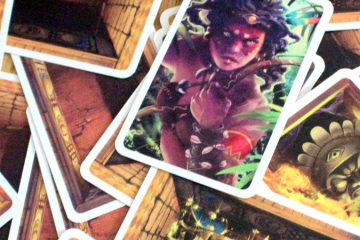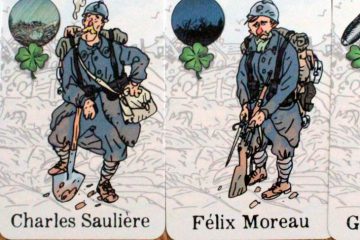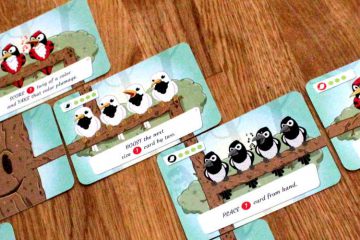Libellud Finding out how the ghost of Warwick Manor died is tough. If you don’t know Mysterium, it’s a murder[…]
Read more

Libellud Finding out how the ghost of Warwick Manor died is tough. If you don’t know Mysterium, it’s a murder[…]
Read more
Iello Meka-Dog has come to town, and he’s the sort of bad dog that isn’t impressed by a rolled-up newspaper.[…]
Read more
A mysterious temple in the jungle, untold treasures inside. But it is pretty darn dark inside here, impossible to see anything. We’ll just feel around for the doors and hope we find some treasure. But the sound is weird. I could swear there are more footsteps in here than we brought people in…
That’s the somewhat peculiar premise of Tempel des Schreckens (translated: Temple of Terror), a German version of Yusuke Sato’s social deduction game Don’t Mess with Cthulhu / Timebomb. (There appear to be some minor rules changes, so I’m not going to call it the same game.) A group of adventurers has found a temple in the middle of the jungle and enter it in search for treasure. Inside, unnoticed by all of them, they are joined by a number of temple guardians who want to lure the expedition into the temple’s fire traps. And because everyone is only looking at their smartphone nowadays, no one knows which group any of the others belong to. Guys, we’ve been walking through the jungle together for weeks, but I can’t tell you apart from the women guarding this temple.
Read more
Fireside Games What has the world come to when even a game where you play a giant monster and want[…]
Read more
Boardgames don’t really have an equivalent to literature. We gamers don’t usually consider the categories of literary fiction versus genre fiction, we think about light games and heavy games instead, or about different game mechanics. But by most criteria, the vast majority of games are more like genre fiction: advancing linearly, focused on a big payoff at the end, and made to entertain, not to invite reflection on their subject.
What you might call literary games are not entirely unheard of, though. One fine example is The Grizzled by Fabien Riffaud and Juan Rodriguez, a cooperative game set in World War One. The setting in itself is not what sets The Grizzled apart, though. Plenty of games are set in the two big wars. But in this one you don’t move tanks across a map, you don’t heroically storm beaches, and you don’t go home to live happily ever after, even if you win.
Read more
Space Cowboys Look at gem trading game Splendor, all grown up after three years. The straightforward – but not simple[…]
Read more
Bruno Cathala is one of those game designers who aren’t married to one genre or one game mechanic they keep coming back to. Games with his name on the box include Shadows over Camelot, Cyclades, 7 Wonders: Duel and many more. The only thing they really have in common is that they are great games. That list is now joined by Kingdomino, a kingdom building game using Dominoes-like tiles. It’s a light family game and has nothing in common with any of Bruno’s other games, mechanically speaking. It is nominated for the Spiel des Jahres 2017, usually a good indicator for a great game.
Read more
Wizards of the Coast / Avalon Hill We had no idea this was coming when we did the Nostalgia post[…]
Read more
Czech Games Edition The Czech Games Edition newsletter had some new releases for this year, and I think there’s something[…]
Read more
When birds start telling you to do things and it’s not your pet parrot demanding crackers, that’s an indicator you might want to meet with your friendly neighborhood mental health specialist soon. Have your health insurance ready, then, because you’re about to take a whole bunch of orders from avian high command.
The Bird Told Me To Do It is a card laying game by Carl Chudyk (Glory to Rome, Innovation,…) that works on a somewhat smaller scale than his other games. You’re not going to build an empire, you won’t control a civilization from the stone age until they discover nuclear power. All you want to do is to have your birds be the most numerous on the tree. It sounds so simple, right?
Read more